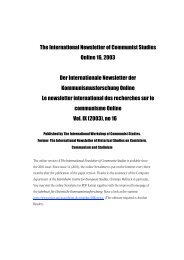VOL. XVI (2010), NO 23 - The International Newsletter of Communist ...
VOL. XVI (2010), NO 23 - The International Newsletter of Communist ...
VOL. XVI (2010), NO 23 - The International Newsletter of Communist ...
Erfolgreiche ePaper selbst erstellen
Machen Sie aus Ihren PDF Publikationen ein blätterbares Flipbook mit unserer einzigartigen Google optimierten e-Paper Software.
<strong>The</strong> <strong>International</strong> <strong>Newsletter</strong> <strong>of</strong> <strong>Communist</strong> Studies Online <strong>XVI</strong> (<strong>2010</strong>), no. <strong>23</strong> 35<br />
Nikolas R. Dörr, Zentrum für Zeithistorische Forschung, Potsdam (Germany):<br />
“<strong>The</strong> Red Threat”. Eurocommunism in Italy as a Security Problem for the<br />
United States <strong>of</strong> America and the Federal Republic <strong>of</strong> Germany 1969-1980. PhD<br />
Project. 1<br />
<strong>The</strong> keyword “Eurocommunism” quickly established itself as a generic term for reform efforts<br />
towards a Western understanding <strong>of</strong> democracy in the communist parties <strong>of</strong> Western Europe<br />
after the Yugoslav journalist Frane Barbieri first used the term in this context in the Milan<br />
daily newspaper Giornale Nuovo on 26 th June 1975. Mainly as a result <strong>of</strong> the spectacular<br />
electoral success <strong>of</strong> the Italian <strong>Communist</strong> Party (PCI), the possibility <strong>of</strong> a left-wing<br />
government in France during the communist-socialist Union de la gauche, and the<br />
uncertainty about the results <strong>of</strong> the Partido Comunista de España in the first free elections<br />
after the Franco-dictatorship in June 1977 an intense scientific and political dispute took<br />
place in the mid-1970s about the complex <strong>of</strong> “Eurocommunism”. <strong>The</strong> consequence was a<br />
flood <strong>of</strong> mainly political science publications in the 1970s and early 1980s.<br />
This work is concentrated on the perception <strong>of</strong> Eurocommunism by the governments <strong>of</strong> the<br />
United States <strong>of</strong> America and the Federal Republic <strong>of</strong> Germany and their foreign and security<br />
policy strategy to deal with the Italian version <strong>of</strong> Eurocommunism. <strong>The</strong> PCI, on the one hand,<br />
represented the most influential party <strong>of</strong> Eurocommunism. On the other hand, the perception<br />
<strong>of</strong> Italian Eurocommunism by the governments <strong>of</strong> the United States and Western Germany<br />
led to two completely different foreign and security policy strategies. In my thesis I am going<br />
to describe, compare and evaluate these strategies.<br />
Until during the Second World War, the foreign and security policy <strong>of</strong> the United States <strong>of</strong><br />
America showed only a marginal interest in Italy, particularly in the PCI. This changed<br />
radically with the entry <strong>of</strong> the USA in the Second World War 1941. Due to its new strategic<br />
military position (e.g. Italy’s role as a bridgehead to Africa and the Middle East and as a<br />
potential front-line state against the communist countries <strong>of</strong> Yugoslavia and Albania after the<br />
war) Italy was now vital for the security policy <strong>of</strong> the United States and the NATO, founded in<br />
1949. From the liberation <strong>of</strong> Italy from fascism to the end <strong>of</strong> the Cold War, American and also<br />
Western German policy was to embed this strategically important country into the Western<br />
alliance. This included a security policy <strong>of</strong> curbing the influence <strong>of</strong> the Italian communists.<br />
Since the early 1960s, this system, in which the Italian <strong>Communist</strong>s were supposed to be<br />
kept out at any price from any government involvement, fell into a crisis. <strong>The</strong> previously<br />
seemingly safe structural majority <strong>of</strong> the Christian Democrats (DC), in conjunction with small<br />
parties <strong>of</strong> the right or center-left, became endangered through the continuous expansion <strong>of</strong><br />
the PCI. With the continuous growth <strong>of</strong> <strong>Communist</strong> influence not only at all levels <strong>of</strong> the<br />
political system <strong>of</strong> Italy, but also in cultural, social and media spheres, the United States and<br />
Western Germany were faced with the problem that a participation <strong>of</strong> <strong>Communist</strong>s in the<br />
government <strong>of</strong> a strategically important NATO member state was possible. <strong>The</strong> defeat <strong>of</strong> the<br />
Christian Democrats in the divorce referendum in May 1974 and the Italian regional elections<br />
on June 15 1975 had indicated what might happen in the coming parliamentary elections in<br />
June 1976. <strong>The</strong> parliamentary elections <strong>of</strong> 20 th June 1976 showed a great success for the<br />
PCI. <strong>The</strong> party obtained 33.4% <strong>of</strong> the vote and reduced the distance to the DC to only 4.3<br />
1 Supervisor: Pr<strong>of</strong>. Dr. Thomas Lindenberger, Director <strong>of</strong> the Ludwig-Boltzmann-Institute for European History and<br />
Public Spheres, Vienna.














